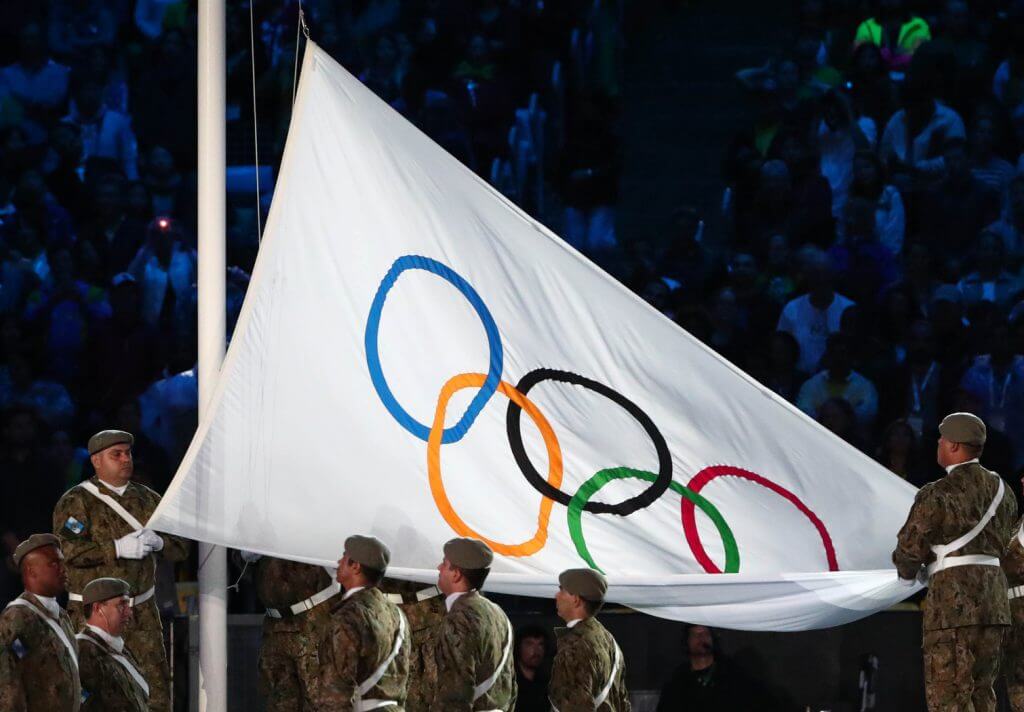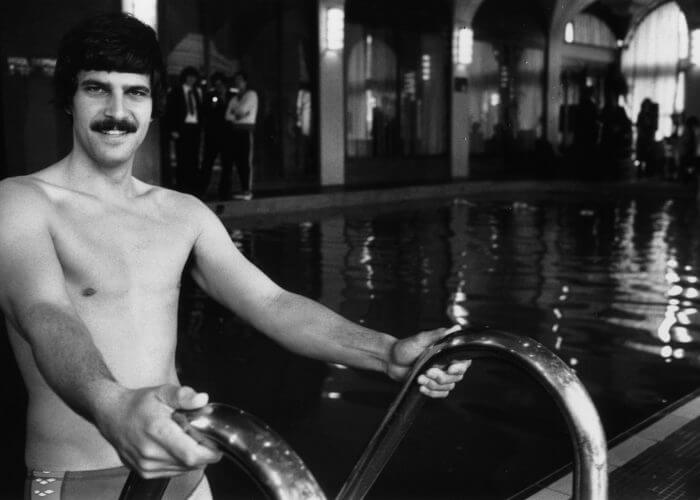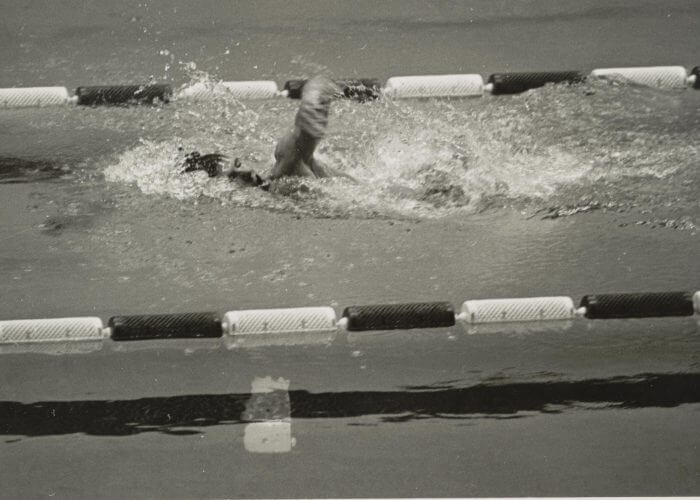The Tokyo Postponement in Perspective: What Has (and Hasn’t) Stopped the Olympics

Olympic Perspective from the Past for the Present generation coming to terms with a shift from Tokyo 2020 to 2021 that offers hope not finality
This weekend, Swimming World is trawling back in history to find some of the stories of the past that contribute to our series in search of perspective for the present season of social-distancing, closures that stretch to pools, cancellations and postponements that have turned the sporting seascape and landscape into a desert.
- Olympic Perspective: The Heights Of Hveger Never Seen & Other Careers Lost To War
- Olympic Perspective: Alfred Nakache, The “Swimmer of Auschwitz” & What It Means To Overcome
This week’s news of an Olympic postponement rippled across the world, not just for its symbolism in the coronavirus pandemic but for its sheer unprecedented nature. The Olympic Movement has weathered boycotts and world wars. It has navigated (often unsuccessfully but still without pause) such international catastrophes as Apartheid and the Nazi regime, plus dozens of civil wars and the full gamut of conflicts and chaos.
The COVID-19 outbreak’s ability to knock the Olympics out of commission until 2021 is a testament to the virus’s threat to humanity and the gravity of the public-health situation across the globe. It’s only the fourth time in 14 decades of the modern Olympics that the Games have been postponed or cancelled. It’s notable to look at not just what has caused Olympic postponements before, but what massive events haven’t moved the Games in the way that coronavirus has, to appreciate the enormity of the moment.
The cancellations: 1916, 1940, 1944
The 2020 Tokyo Games falls in line with these three for the ignominy of not going on as scheduled. This installment stands alone for, 1) not requiring a World War, and 2) having the possibility of continuing at a later date. But the IOC’s pattern of handling such decisions remains applicable.
The 1916 Games were supposed to be held in Berlin, but the outbreak of World War I made that impossible. There were mooted discussions in 1915 about moving the Games to the United States, which didn’t enter the war until April 1917. Even then, the notion of nations engaged in war with each other competing together was far-fetched, and the overwhelming majority of Olympic nations and power was housed on a European continent riven by war. All Olympic meetings were suspended from 1915-18, making the 1916 cancellation little more than a formality.
The 1940 Games present a prescient parallel to the IOC operations of the present. Despite Europe again exploding into war, the Games were officially on until April 1940, what the Associated Press then called, “a football for the world’s war lords for three years.”
The decision to cancel was shockingly delayed in retrospect. The 1940 Games were awarded in 1936 to Japan. They were touted as the first Eastern Olympics, but there was immediate buyer’s remorse after seeing how the Nazi regime politicized the 1936 Berlin Games and the increasing imperialism of Japan, which invaded China in 1937. By the following summer, citing a scarcity of resources in a war effort, a growing movement to boycott the Games from the West and a retraction from the global stage, Japan relinquished the Games.
Hosting duties went to Helsinki. But when Germany invaded Poland and the Soviet Union invaded Finland in the fall of 1939, those Games were doomed to become a Missing Olympics. (There’s an interesting theory about a 40-year curse in the Olympics, from the 1940 Tokyo Games to the 1980 Moscow Games that the U.S. and many western nations boycotted to the 2020 Tokyo Games. Buckle up for the 2060 Mars Games?)
The IOC, though, continued to try to operate as normal. In 1939, it awarded the 1944 Games to London. Such was the ensuing battle and cost of lives to all of Europe that a 1944 cancellation hardly needed to be announced.
The Games that went on: 1968, 1972 and 1996
Many Olympic watchers waited weeks to see how the IOC would react to coronavirus. And compared to historical perspectives, this year’s actions to postpone were relatively swift and decisive. Often in face of past crises, the IOC has opted to barrel forward.

Mark Spitz as an Arena ambassador the first time round – Photo Courtesy: by Graham Morris/Evening Standard via Getty Images, courtesy of arena
The biggest black eye for the Olympic Movement since World War II, even more than Cold War boycotts of 1980 and 1984, was the 1972 Munich terrorist attack that killed 11 Israeli athletes and coaches. Orchestrated by the Black September Organization, a Palestinian terrorist group, the attack also killed a West German police officer and left five terrorists dead.
It delayed the Olympics for about a day, and even that was deemed monumental. Events continued even as the standoff with the terrorists, who had broken into the Olympic village to capture hostages, raged. The attack began in the wee hours of Sept. 5. By the evening of Sept. 6, after 80,000 people gathered in the Olympic Stadium for a public mourning, the Games continued, as decreed by Avery Brundage, the 84-year-old outgoing IOC president.
“The Olympic peace was broken by a murderous attack by criminal terrorists,” read an IOC statement. “The entire civilized world condemns this barbaric act with disgust.”
What remained of the second week of competition was diminished. Mark Spitz, who’d won seven gold medals in the Games’ first week, fled Germany, fearing that his Jewish heritage would make him a target. Members of the Norwegian and Dutch delegations withdrew from the Games, as did the entire Egyptian and Syrian squads.
Terrorism blighted the 1996 Games in Atlanta with the bombing at Centennial Olympic Park. A pipe bomb went off just after 1 a.m. outside a concert venue July 27, killing one person and injuring more than 100 (a cameraman also died of a heart attack on the scene).

Mike Burton and others swam on at the 1968 Games. Photo Courtesy: Swimming World Archive
The bombing was condemned in the harshest of terms by American president Bill Clinton, realizing the country’s fears in what was called, “the largest peacetime security operation for a public event in American history.” But after consultation with his cabinet and Congress, the Games continued with minimal interruptions.
Both of those Games were underway by the time terror intruded. But the 1968 Games were a different story. And as utterly unprecedented as the current situation is, the circumstances in Mexico City present parallels. Consider these headlines, from the New York Times, ahead of the Oct. 12 opening ceremonies:
- Sept. 23: HUNDREDS SEIZED IN MEXICO CLASHES; One Killed and Dozens Hurt During a Night of Fighting by Students and Police Students and Police Clash Throughout Mexico City
- Sept. 24: 40 Are Wounded in Mexico City As Police Clash With Students
- Sept. 25: Students Fight the Police Through the Night 3 Are Killed and Many Injured in Mexico City Battle
- Sept. 26: Mexico City Death Toll Increases in Continuing Student Clashes
The student demonstrations came to a head Oct. 4, a story that warranted Page 1 treatment by the Times: “Deaths Put at 49 in Mexican Clash; 500 wounded after troops fire on students at rally – 1,500 taken prisoner.” What was then known as La Noche Triste (the Night of Sorrows) involved hundreds of students being fired upon by soldiers in the Plaza de las Tres Culturas. No official death toll has ever been tallied from the Tlatelolco Massacre. It was the culmination of a summer of protests by students, leading to skirmishes with police and the government seizing arms.
Here’s the way the New York Times, in a stunning series of rhetorical hairpin bends, navigated it:
“The atmosphere has grown particularly threatening since Wednesday night, when the conflict again exploded into a violent gun battle in which at least 30 people were killed. But despite the tension, the Olympics still seem to have the wholehearted support of most people, and visitors will find them friendly and eager to please. And most of the city looks festive, even if some of its citizens do not feel festive, and some of its sections still show the signs of battle.”
The IOC, though, never wavered on its commitment to Mexico City. Like the 1940 Games, this was seen as a pioneering one, the first Olympics in the global south. So Brundage brushed the ideas off as “student manifestations,” even as the death toll climbed.
In 2020, it’s taken the IOC weeks to weigh its decision, trying to balance the billions of investment from Tokyo in the Games with the needs of athletes and spectators the world over. But in ignoring its original four-week timeline and deciding more quickly, the IOC of today may end up in better standing than its predecessors.




Aaron Kearney